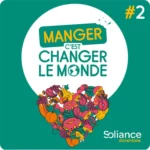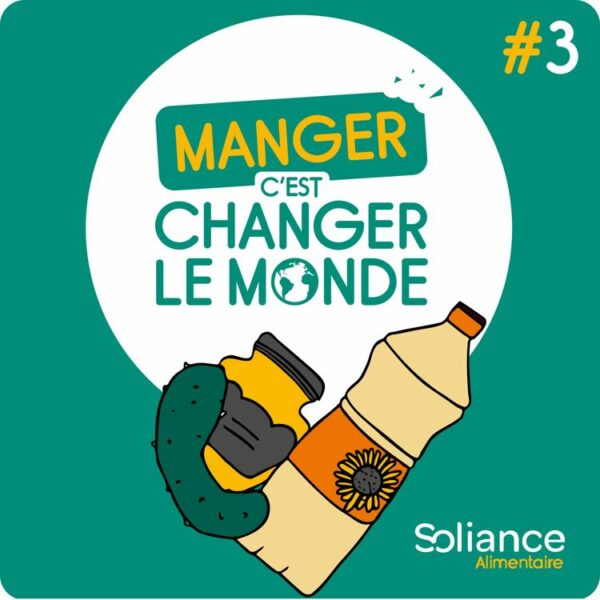Manger, c’est changer le monde, la série de podcasts qui décode les systèmes alimentaires – Épisode 3
Pénurie de moutarde, produits de plus en plus difficiles à trouver en rayon ou au sein de nos entreprises agri-agroalimentaires… Certains aliments que nous avions l’habitude d’acheter sans se poser de questions deviennent de plus en plus difficile ou impossible à trouver. Depuis maintenant plusieurs mois, nous observons ces pénuries alimentaires en France – le symptôme d’un dérèglement systémique en lien avec plusieurs crises mondiales. A travers ce 3ème épisode de Manger c’est changer le Monde, Henri Bouillot, ancien dirigeant de Soliance Alimentaire, nous livre plusieurs insights à ce sujet.
Pénuries alimentaires en France : une mise en garde du GIEC depuis 2015
Aujourd’hui, la société fait face à plusieurs facteurs de pression internationaux : l’escalade démographique, l’urgence climatique, les rivalités économiques, ou encore le vieillissement de la population. Ces tendances de fond sont en réalité la trame de plusieurs pénuries alimentaires à venir. Le GIEC avait pourtant averti l’ensemble des dirigeants internationaux dès 2015 :
La persévération dans les trajectoires actuelles aura des répercussions négatives : l’alimentation sera de plus en plus onéreuse et l’insécurité alimentaire deviendra un problème de grande échelle.
Malgré cet avertissement, nous voyions cela comme quelque chose de lointain et abstrait. Aujourd’hui, force est de constater que cette situation a déjà passé le seuil de notre porte…
Entre la crise du COVID-19, le conflit russo-ukrainien à l’origine de la hausse des coûts de l’énergie et le comportement de plus en plus autarcique de la Chine en termes de matières premières, les prévisions du GIEC n’ont fait que s’accélérer. Les situations spectaculaires de pénuries alimentaires mondiales interviennent beaucoup plus vite que prévues.
Pour Soliance Alimentaire, la question des pénuries alimentaires est devenue un sujet d’actualité prégnant pour les entreprises et territoires. Ils doivent aujourd’hui se prémunir de telles menaces en sécurisant au maximum leurs chaînes de sourcing et d’approvisionnement.
Quels sont les facteurs à l’origine des pénuries alimentaires en France et dans le monde ?
Depuis plusieurs années maintenant, un certain nombre de pays se sont concentrés et spécialisés dans la production de certaines matières premières. Si l’on prend l’Ukraine et la Russie, c’est le cas des céréales et du tournesol. Sur 50 000 000 de tonnes de tournesols produits dans le monde, plus de la moitié viennent de ces deux pays ! Prendre conscience de cette spécialisation permet de mieux comprendre pourquoi la crise russo-ukrainienne a eu tant d’impact sur la filière. Cette concentration de la production créant une relation de dépendance entre les pays producteurs et non-producteurs. Nous comprenons donc mieux comment une crise géopolitique peut être à l’origine d’une pénurie alimentaire.
Intéressons-nous à un autre produit. Les graines de moutarde sont essentiellement produites au Canada. Cette année, ce pays a connu une situation météorologique catastrophique pour ce type de cultures. Cette situation a entraîné de mauvaises récoltes, suivies de ruptures de moutarde en France. Pourtant, la Bourgogne a longtemps été spécialisée dans ce type de cultures. La facilité d’import depuis le Canada a progressivement poussé la France à se désengager de cette production. Nous sommes ainsi devenus dépendants du Canada et de ses aléas climatiques en ce qui concerne la production de moutarde française, malgré notre savoir-faire ancestral.
Les bonnes pratiques à mettre en place pour lutter contre le risque de pénuries alimentaires
Face à cette concurrence globalisée, aux aléas climatiques et aux tensions politiques, plusieurs bonnes pratiques peuvent être mises en place. Pour Henri Bouillot, la règlementation des chaînes d’approvisionnement en pénurie alimentaire n’est pas suffisante. Il existe plusieurs autres enjeux sur lesquels travailler : l’économique, le marketing et l’ensemble des disciplines de l’entreprise. Pour expliquer son point de vue, il prend l’exemple du cornichon français :
« Un cornichon indien coûte 5 fois moins cher que son cousin français à produire. Pour une entreprise, il est donc quasiment impensable de mettre un produit cinq fois plus cher dans sa boîte de cornichons… Pour aller plus loin, il faut être en mesure d’analyser la chaîne de valeur de cette matière première. Dans ce cas, c’est la récolte du cornichon qui coûte cher. En l’occurrence, plus celui-ci sera gros, moins sa récolte sera onéreuse, les coûts de main d’œuvre étant ainsi réduits. Pour faire baisser le prix d’un cornichon français, nous pouvons donc opter pour l’augmentation de son calibre. Ensuite, certains autres enjeux de mécanisation permettront de faire baisser les coûts. L’innovation est également centrale pour développer une filière française du cornichon. Dans la grande distribution, les consommateurs sont généralement à même d’accepter une différence de prix raisonnable lorsque le produit bénéficie d’une origine France comme celle-ci. ».
A travers ce cas, Henri Bouillot nous montre bien comment la combinaison entre technologie, acceptation et transformation de la façon d’acheter, est la clé pour des filières plus raisonnées. Pour y arriver, les entreprises ne doivent pas seulement rechercher des acheteurs, mais des agronomes et des talents en mesure de combiner ces différentes approches.
Lutte contre les pénuries alimentaires : comment faire évoluer les entreprises dans le bon sens ?
Faire évoluer nos systèmes alimentaires nécessite l’acceptation des consommateurs, mais aussi un changement de fonctionnement de la part des entreprises. Pour Henri Bouillot, cet effort passe tout d’abord par l’engagement de la direction générale et des actionnaires. Ces changements impliquent une transformation de la logique de l’entreprise. Les modèles en la matière sont les structures dont les dirigeants ont une forte conscience et un désir ancré de s’engager dans la transformation de leur mode de fonctionnement :
« La première chose est la présence de dirigeants qui portent ce nouveau souffle, remettent en question les routines habituelles des achats et la notion de profitabilité à tout prix. Des dirigeants qui savent passer de la logique de prix matière à un prix valeur, qui intègre lahttps://soliancealimentaire.com/podcasts/systemes-alimentaires/ notion de risques en matière de production étrangère. »
Pour Henri Bouillot, l’évolution positive des entreprises repose donc sur un changement d’état d’esprit et l’intégration de la valeur « solidarité » au sein et pour les filières.
Le rôle de Soliance Alimentaire dans la transformation des entreprises et filières
Soliance Alimentaire comptent de nombreux spécialistes filières en interne : fruits et légumes, produits laitiers, céréales, etc. Ces talents dotent la structure d’une connaissance extensive des chaînes de coûts et des acteurs importants de chacune de ces filières. Cela permet aux consultants d’élaborer des scénarii alternatifs aux situations préliminaires étudiées lors du premier diagnostic des chaînes d’approvisionnement de l’entreprise.
Soliance Alimentaire est souvent confrontée aux équipes d’entreprises industrielles, représentées par des personnes souvent peu éclairées au sujet des métiers en amont de la chaîne. L’objectif est alors de former ces salariés et d’effectuer un certain nombre de recrutements pour compléter les compétences de l’entreprise. De cette manière, les consultants accompagnent tout ce processus en amont du lancement du projet de transformation. Cette première étape peut prendre de 6 mois à un an. Ensuite, en aval, Soliance Alimentaire conduit l’ensemble des études de faisabilité et gère le cadrage avec les partenaires afin de construire ces nouvelles filières. Pour Henri Bouillot, « il s’agit de projets qui prennent plusieurs années et qui nécessitent une vraie volonté stratégique de la part des dirigeants ».
Vous avez aimé ce contenu ? Rendez-vous le mois prochain pour un nouvel épisode de Manger, c’est changer le monde.
En attendant, n’hésitez pas à partager cet épisode autour de vous, mais également à donner vos avis sur notre série de podcasts.
Pour patienter, écoutez un autre épisode de Manger c’est changer le monde :




